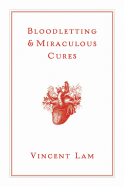
 The new winner of the Giller Prize, Canada's top literary honor, is a collection of 12 interrelated stories about four young medical students and their unfolding lives as doctors. The stories are meant to dazzle, and they do.
The new winner of the Giller Prize, Canada's top literary honor, is a collection of 12 interrelated stories about four young medical students and their unfolding lives as doctors. The stories are meant to dazzle, and they do. The young Toronto author, Vincent Lam, is not only a doctor himself but an unfairly talented writer as well, with a swift, honest style and a compelling sense of storytelling. Again and again he quickly takes the moral pulse of a character. Some of these stories are knockouts, featuring spellbinding plots with all kinds of messy complications and unexpected resolutions. A possible poisoning that's also a possible psychosis; a violent, mentally unstable arrested man who may be the victim of police brutality; a harrowing pregnancy--these are the dramatic medical set-pieces against which the personal dramas unfold.
The first and third stories, "How to Get into Medical School, Parts I and II," provide the narrative fulcrum for the other tales. They're a two-part self-contained novella, a Proust-like narrative of obsessive love--the decades-spanning, sometimes one-sided passion of Fitzgerald for the cool, succeed-at-all-costs Ming.
Along with two of their classmates, Chen and Sri, these four students-become-doctors are each featured in one or more of the separate tales, weaving in and out of each other's personal and professional lives as they go about loving and marrying each other, infecting each other with diseases, treating each other.
Lam presents the reader with the dizzying ambiguities that haunt physicians, making their lives a chain of educated guesses. How honest should a doctor be to a patient without hope? On an emergency, should a doctor run or walk down the hall? Is an elevator excusable when every second counts? What if the doctor suspects the police have gone a little too far? What if the doctor knows the anesthesiologist won't get there in time?
It's a show-stopper of a debut, a pulse-pounding tribute to medicine and the complexity of human motivation, concluding with the terrifying introduction of SARS into the world. Heartfelt, human stuff. Then there's one more tale.
Unfortunately, the last story is inexplicably negative, a chain of vignettes composing the frustrating, rage-filled day of a hair-trigger, whining, overworked doctor on the night shift. It comes off as self-pitying and mean-spirited, not to mention embarrassingly over-written. I can't imagine why it's included.--Nick DiMartino

